Wei Ruan
Knowledge Distillation and Dataset Distillation of Large Language Models: Emerging Trends, Challenges, and Future Directions
Apr 20, 2025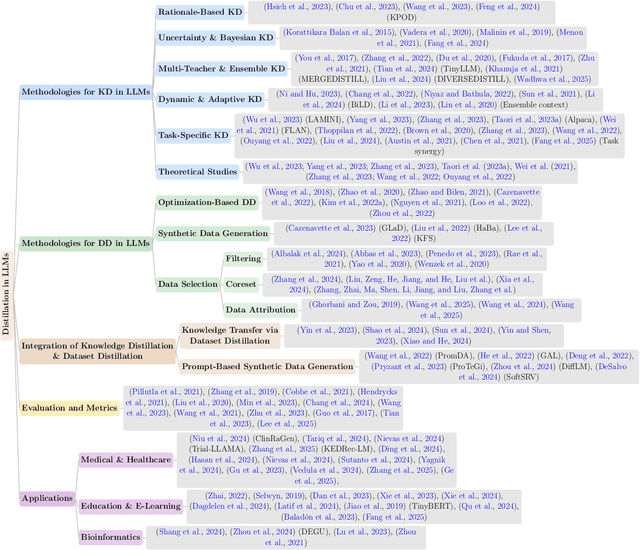
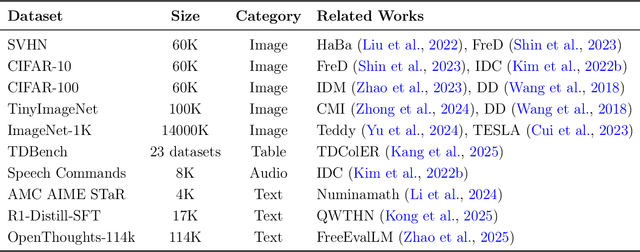
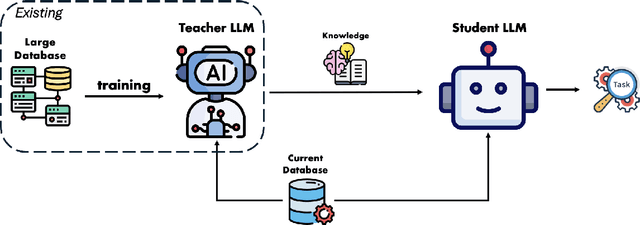
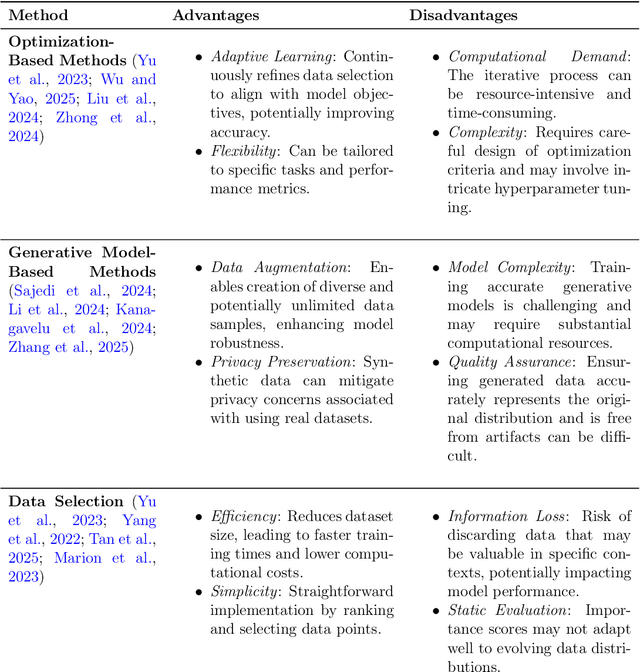
Abstract:The exponential growth of Large Language Models (LLMs) continues to highlight the need for efficient strategies to meet ever-expanding computational and data demands. This survey provides a comprehensive analysis of two complementary paradigms: Knowledge Distillation (KD) and Dataset Distillation (DD), both aimed at compressing LLMs while preserving their advanced reasoning capabilities and linguistic diversity. We first examine key methodologies in KD, such as task-specific alignment, rationale-based training, and multi-teacher frameworks, alongside DD techniques that synthesize compact, high-impact datasets through optimization-based gradient matching, latent space regularization, and generative synthesis. Building on these foundations, we explore how integrating KD and DD can produce more effective and scalable compression strategies. Together, these approaches address persistent challenges in model scalability, architectural heterogeneity, and the preservation of emergent LLM abilities. We further highlight applications across domains such as healthcare and education, where distillation enables efficient deployment without sacrificing performance. Despite substantial progress, open challenges remain in preserving emergent reasoning and linguistic diversity, enabling efficient adaptation to continually evolving teacher models and datasets, and establishing comprehensive evaluation protocols. By synthesizing methodological innovations, theoretical foundations, and practical insights, our survey charts a path toward sustainable, resource-efficient LLMs through the tighter integration of KD and DD principles.
AD-GPT: Large Language Models in Alzheimer's Disease
Apr 03, 2025Abstract:Large language models (LLMs) have emerged as powerful tools for medical information retrieval, yet their accuracy and depth remain limited in specialized domains such as Alzheimer's disease (AD), a growing global health challenge. To address this gap, we introduce AD-GPT, a domain-specific generative pre-trained transformer designed to enhance the retrieval and analysis of AD-related genetic and neurobiological information. AD-GPT integrates diverse biomedical data sources, including potential AD-associated genes, molecular genetic information, and key gene variants linked to brain regions. We develop a stacked LLM architecture combining Llama3 and BERT, optimized for four critical tasks in AD research: (1) genetic information retrieval, (2) gene-brain region relationship assessment, (3) gene-AD relationship analysis, and (4) brain region-AD relationship mapping. Comparative evaluations against state-of-the-art LLMs demonstrate AD-GPT's superior precision and reliability across these tasks, underscoring its potential as a robust and specialized AI tool for advancing AD research and biomarker discovery.
From Task-Specific Models to Unified Systems: A Review of Model Merging Approaches
Mar 12, 2025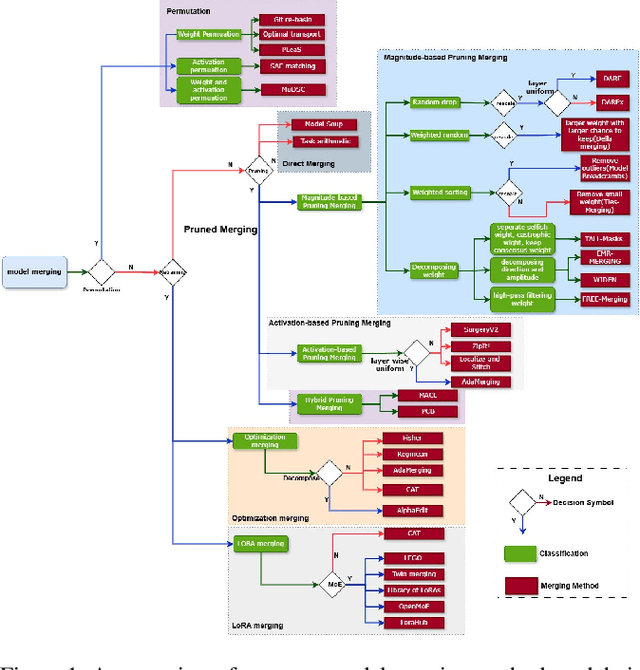
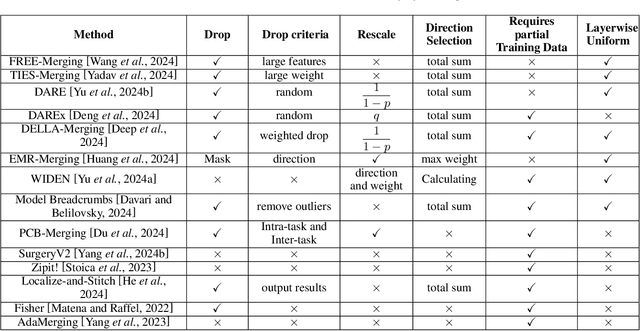
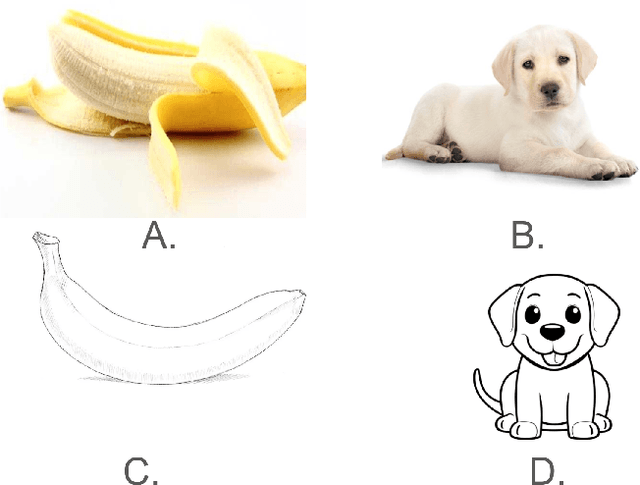
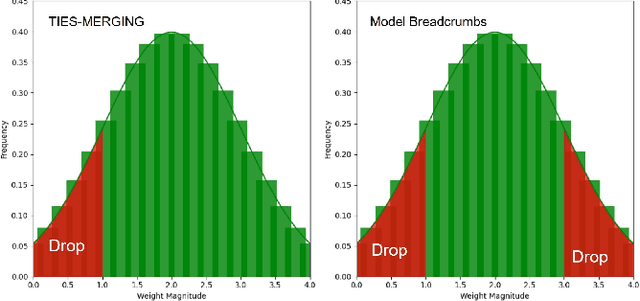
Abstract:Model merging has achieved significant success, with numerous innovative methods proposed to enhance capabilities by combining multiple models. However, challenges persist due to the lack of a unified framework for classification and systematic comparative analysis, leading to inconsistencies in terminologies and categorizations. Meanwhile, as an increasing number of fine-tuned models are publicly available, their original training data often remain inaccessible due to privacy concerns or intellectual property restrictions. This makes traditional multi-task learning based on shared training data impractical. In scenarios where direct access to training data is infeasible, merging model parameters to create a unified model with broad generalization across multiple domains becomes crucial, further underscoring the importance of model merging techniques. Despite the rapid progress in this field, a comprehensive taxonomy and survey summarizing recent advances and predicting future directions are still lacking. This paper addresses these gaps by establishing a new taxonomy of model merging methods, systematically comparing different approaches, and providing an overview of key developments. By offering a structured perspective on this evolving area, we aim to help newcomers quickly grasp the field's landscape and inspire further innovations.
Large Language Models for Bioinformatics
Jan 10, 2025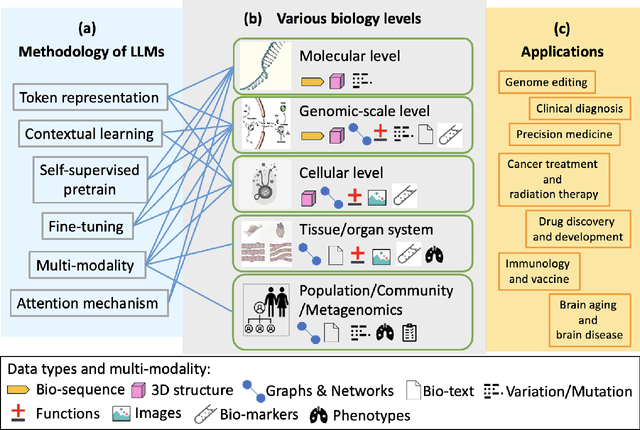
Abstract:With the rapid advancements in large language model (LLM) technology and the emergence of bioinformatics-specific language models (BioLMs), there is a growing need for a comprehensive analysis of the current landscape, computational characteristics, and diverse applications. This survey aims to address this need by providing a thorough review of BioLMs, focusing on their evolution, classification, and distinguishing features, alongside a detailed examination of training methodologies, datasets, and evaluation frameworks. We explore the wide-ranging applications of BioLMs in critical areas such as disease diagnosis, drug discovery, and vaccine development, highlighting their impact and transformative potential in bioinformatics. We identify key challenges and limitations inherent in BioLMs, including data privacy and security concerns, interpretability issues, biases in training data and model outputs, and domain adaptation complexities. Finally, we highlight emerging trends and future directions, offering valuable insights to guide researchers and clinicians toward advancing BioLMs for increasingly sophisticated biological and clinical applications.
Evaluation of OpenAI o1: Opportunities and Challenges of AGI
Sep 27, 2024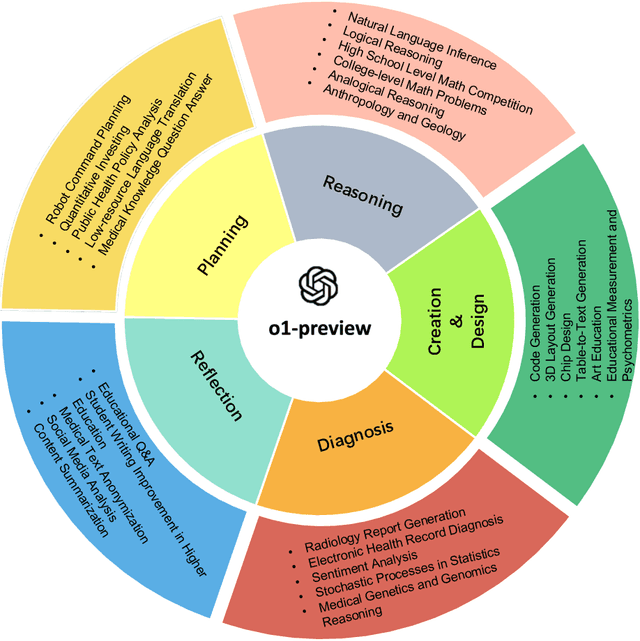
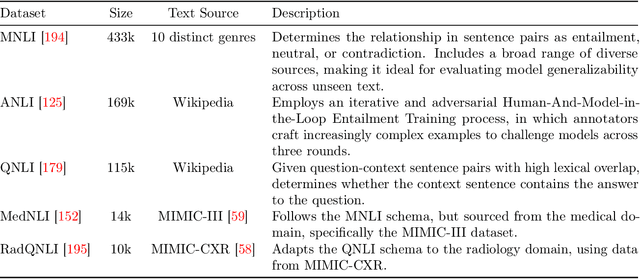
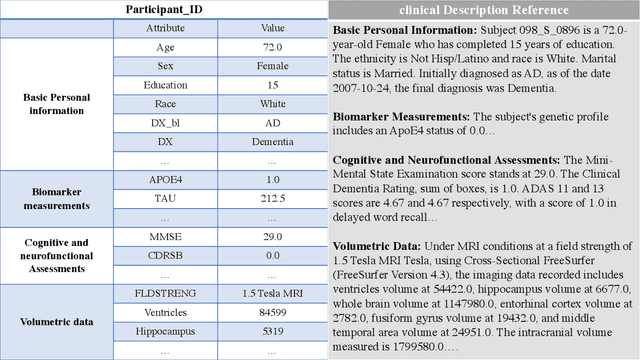

Abstract:This comprehensive study evaluates the performance of OpenAI's o1-preview large language model across a diverse array of complex reasoning tasks, spanning multiple domains, including computer science, mathematics, natural sciences, medicine, linguistics, and social sciences. Through rigorous testing, o1-preview demonstrated remarkable capabilities, often achieving human-level or superior performance in areas ranging from coding challenges to scientific reasoning and from language processing to creative problem-solving. Key findings include: -83.3% success rate in solving complex competitive programming problems, surpassing many human experts. -Superior ability in generating coherent and accurate radiology reports, outperforming other evaluated models. -100% accuracy in high school-level mathematical reasoning tasks, providing detailed step-by-step solutions. -Advanced natural language inference capabilities across general and specialized domains like medicine. -Impressive performance in chip design tasks, outperforming specialized models in areas such as EDA script generation and bug analysis. -Remarkable proficiency in anthropology and geology, demonstrating deep understanding and reasoning in these specialized fields. -Strong capabilities in quantitative investing. O1 has comprehensive financial knowledge and statistical modeling skills. -Effective performance in social media analysis, including sentiment analysis and emotion recognition. The model excelled particularly in tasks requiring intricate reasoning and knowledge integration across various fields. While some limitations were observed, including occasional errors on simpler problems and challenges with certain highly specialized concepts, the overall results indicate significant progress towards artificial general intelligence.
GP-GPT: Large Language Model for Gene-Phenotype Mapping
Sep 15, 2024



Abstract:Pre-trained large language models(LLMs) have attracted increasing attention in biomedical domains due to their success in natural language processing. However, the complex traits and heterogeneity of multi-sources genomics data pose significant challenges when adapting these models to the bioinformatics and biomedical field. To address these challenges, we present GP-GPT, the first specialized large language model for genetic-phenotype knowledge representation and genomics relation analysis. Our model is fine-tuned in two stages on a comprehensive corpus composed of over 3,000,000 terms in genomics, proteomics, and medical genetics, derived from multiple large-scale validated datasets and scientific publications. GP-GPT demonstrates proficiency in accurately retrieving medical genetics information and performing common genomics analysis tasks, such as genomics information retrieval and relationship determination. Comparative experiments across domain-specific tasks reveal that GP-GPT outperforms state-of-the-art LLMs, including Llama2, Llama3 and GPT-4. These results highlight GP-GPT's potential to enhance genetic disease relation research and facilitate accurate and efficient analysis in the fields of genomics and medical genetics. Our investigation demonstrated the subtle changes of bio-factor entities' representations in the GP-GPT, which suggested the opportunities for the application of LLMs to advancing gene-phenotype research.
 Add to Chrome
Add to Chrome Add to Firefox
Add to Firefox Add to Edge
Add to Edge